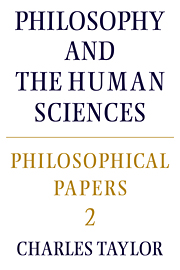Book contents
1 - Interpretation and the sciences of man
Published online by Cambridge University Press: 05 June 2012
Summary
Is there a sense in which interpretation is essential to explanation in the sciences of man? The view that it is, that there is an unavoidably ‘hermeneutica’ component in the sciences of man, goes back to Dilthey. But recently the question has come again to the fore, for instance, in the work of Gadamer, in Ricoeur's interpretation of Freud, and in the writings of Habermas.
Interpretation, in the sense relevant to hermeneutics, is an attempt to make clear, to make sense of, an object of study. This object must, therefore, be a text, or a text-analogue, which in some way is confused, incomplete, cloudy, seemingly contradictory – in one way or another, unclear. The interpretation aims to bring to light an underlying coherence or sense.
This means that any science which can be called ‘hermeneutica’, even in an extended sense, must be dealing with one or another of the confusingly interrelated forms of meaning. Let us try to see a little more clearly what this involves.
We need, first, an object or field of objects, about which we can speak in terms of coherence or its absence, of making sense or nonsense.
Second, we need to be able to make a distinction, even if only a relative one, between the sense or coherence made, and its embodiment in a particular field of carriers or signifiers. For otherwise the task of making clear what is fragmentary or confused would be radically impossible.
- Type
- Chapter
- Information
- Philosophical Papers , pp. 15 - 57Publisher: Cambridge University PressPrint publication year: 1985
- 116
- Cited by



